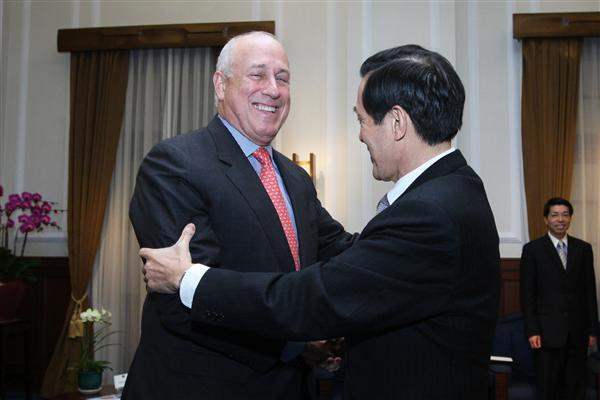News & activities
 News releases
News releases
President Ma Ying-jeou met on the evening of December 10 at the Presidential Office with American scholars attending the 39th Taiwan-American Conference on Contemporary China. After extending a warm welcome on behalf of the government and people of Taiwan, the president exchanged opinions with the visitors on a broad range of topics associated with cross-strait ties and the domestic political and economic situation.
President Ma first spoke about Taiwan's current economic status, remarking that the local economy began to stage a recovery at this time last year. Economic growth in the fourth quarter of last year was 9%, in the first half of this year hit 13%, and for 2010 as a whole is poised to hit 9.98%, he said. At the same time, Taiwan's external trade through the first 11 months of this year reached US$480 billion and is expected to top US$500 billion for the year, setting a new record.
President Ma commented that the signing of the cross-strait Economic Cooperation Framework Agreement last June will put cross-strait trade and economic relations on a more systematic footing, and will prevent Taiwan from being marginalized in the process of regional economic integration. At the same time, the agreement has increased the willingness of other countries to explore the possibility of entering into economic cooperation accords with Taiwan, thus indirectly winning more room for Taiwan on the international stage, he said.
In addition to cross-strait relations, President Ma expressed his belief that continued efforts are needed to forge progress on outstanding issues between Taiwan and the United States. Taiwan hopes to purchase F16 C/D series jet fighters from the United States, for example, and he also called for progress toward updating the Trade and Investment Framework Agreement and the signing of a bilateral extradition agreement. President Ma furthermore remarked that the percentage of Taiwan applicants being rejected for US visas has dropped to 2.2% and Taiwan hopes to be included in the US visa-waiver program. The president noted that the US House of Representatives has already passed a resolution supporting Taiwan's participation in the International Civil Aviation Organization, and said he hopes the United States in the future will continue to support meaningful participation by Taiwan in international organizations and activities.
President Ma stressed that Taiwan and the United States maintain close interaction in military and diplomatic affairs. The ROC government, he said, continues to embrace the principle of "being low key and avoiding surprises" to build mutual trust. The benefit of this approach was reflected in remarks made by American Institute in Taiwan Chairman Raymond F. Burghardt during his recent visit here when he said that the current relationship between Taiwan and the United States is at an optimal level and called for the two sides to continue strengthening their cooperative ties.
The visiting delegation was led by Douglas H. Paal, vice president for studies at the Carnegie Endowment for International Peace, and was accompanied to the Presidential Office by Ministry of Foreign Affairs Secretary General Thomas T.S. Cheng to meet President Ma. Also attending the meeting was National Security Council Deputy Secretary-General Chih-kung Liu.



